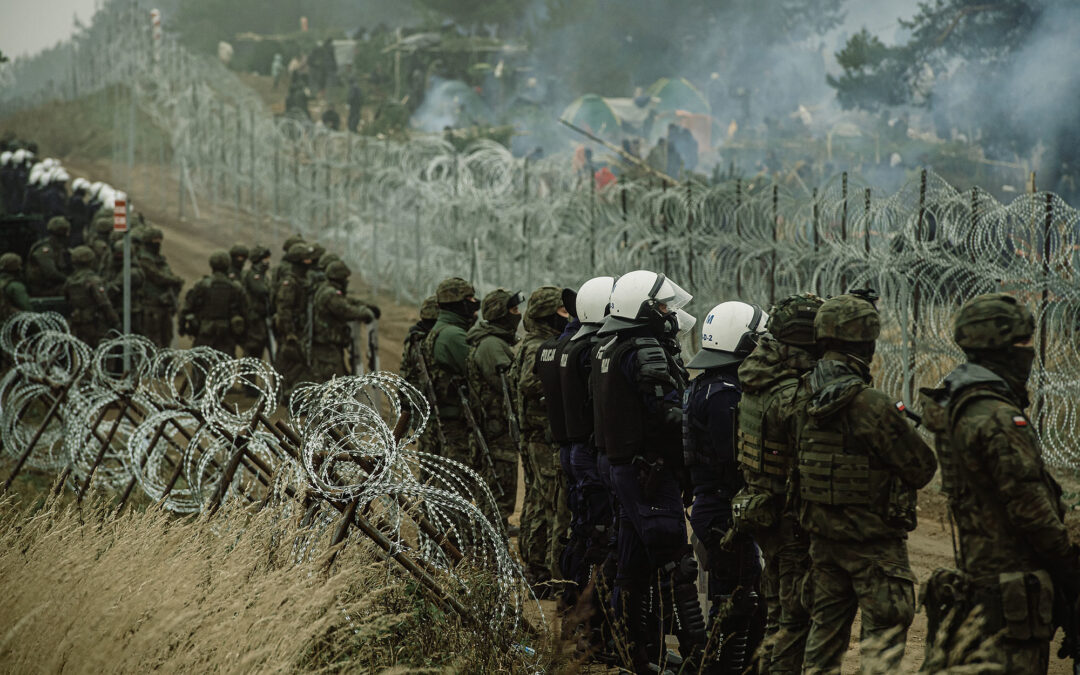Poland is sending a team to Finland to advise the Nordic country on how to protect its border from “hybrid attacks” being launched by Russia.
Finland has this month closed seven of its eight road crossings with Russia and announced yesterday that the final one would also be shut. Those decisions were made in response to a growing number of migrants trying to cross, with Finland saying there is evidence that Russia is behind the development.
Finland to close border with Russia over migrant crossings. Finland has accused Russia of orchestrating the crossings, deliberately helping people without the proper documents to get to the border.https://t.co/LE9j6enfQl
— Kim Goldberg (@KimPigSquash) November 28, 2023
Poland has in recent years experienced a similar issue on its border with Belarus, where since mid-2021 tens of thousands of migrants and asylum seekers – mainly from the Middle East, Asia and Africa – have been trying to cross with the help of the Belarusian authorities.
Speaking last night to broadcaster TVP, the head of Poland’s National Security Bureau (BBN), Jacek Siewiera, announced that a Polish advisory mission was being dispatched to Finland.
“The decision is related to the intensification of hybrid attacks on the Finnish-Russian border,” he explained, adding that a request for support had been made by Finland’s president, Sauli Niinistö, during a visit last week to Warsaw to meet his Polish counterpart Andrzej Duda.
Jednym z wyników wizyty oficjalnej Prezydenta Finlandii Sauli @niinisto na zaproszenie Prezydenta @AndrzejDuda jest oficjalny wniosek o sojusznicze wsparcie w obliczu ataku hybrydowego na fińską granicę. Polska zamierza pozytywnie odnieść się do prośby naszego sojusznika z NATO… pic.twitter.com/Swqk4nP4Yu
— Jacek Siewiera (@JacekSiewiera) November 28, 2023
Poland has “dealt with a whole spectrum of threats: in the information sphere, in the sphere of cognitive warfare, in narrative issues, but also those related to the application of international law and carrying out tasks at the border”, said Siewiera.
“The aim of the mission is to transfer the experience that Poland has gained during this time,” he explained. “We want to provide our new ally within NATO structures with help and our experience.”
According to Finland’s border guard, this month has seen around 900 asylum seekers enter from Russia, up from an average of less than one a day previously. Arrivals are citizens of countries including Morocco, Pakistan, Somalia, Syria and Yemen.
In reference to the “cognitive sphere”, Siewiera explained that he was referring to issues such as “the involvement of civic movements, non-governmental organisations, various actors in the public arena who take part in the discussion about how the state responds in the face of forced migration”.
A German woman has been banned from Poland for five years for violating a ban on entering the area on the border with Belarus where the government recently built an anti-migrant wall.
She was part of a group of activists passing packages through the wall https://t.co/xGJpXoqn2z
— Notes from Poland 🇵🇱 (@notesfrompoland) March 2, 2023
Since the beginning of the Belarus border crisis in 2021, Poland’s government has adopted a tough approach in response, including boosting soldier numbers in the area, building a physical and electronic barrier, and implementing a controversial policy of “pushing back” people across the border.
That has led to criticism from both local activists and international organisations, including the United Nations and Human Rights Watch. A number of Polish court rulings have found the pushbacks to be unlawful.
However, the government argues that it has taken justified measures to protect what is not only Poland’s, but also the EU’s and NATO’s eastern border. Its approach has received backing from Germany and the EU.
"I came to Poland today to express the EU's solidarity as it faces a brutal hybrid attack" from Belarus, said @eucopresident.
This "may look like a migration crisis" but it is in fact "state terrorism" aimed at "destabilising the EU", said @MorawieckiM https://t.co/suGJmmaFl1
— Notes from Poland 🇵🇱 (@notesfrompoland) November 10, 2021

Notes from Poland is run by a small editorial team and published by an independent, non-profit foundation that is funded through donations from our readers. We cannot do what we do without your support.
Main image credit: Irek Dorozanski / DWOT (under CC BY-NC-ND 2.0)

Daniel Tilles is editor-in-chief of Notes from Poland. He has written on Polish affairs for a wide range of publications, including Foreign Policy, POLITICO Europe, EUobserver and Dziennik Gazeta Prawna.



















